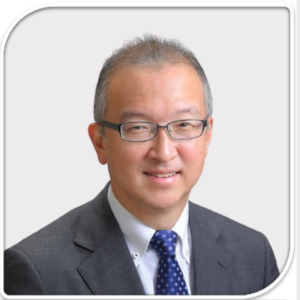
Takanori Kanai
Keio University, Japan
Topic
Prof. Takanori Kanai from Keio University, Japan will join the Targeting Microbiota meeting scheduled on October 8-9, 2025 in Tokyo, Japan and will give a presentation entitled "Microbiota and gastroenterology: Point of view and perspectives".
Summary
Since the report on the application of fecal microbiota transplantation (FMT) to human clostridial infections, attention has focused on the role of intestinal microbiota in human health and diseases. It has also been found that disruption of intestinal microbiota (“dysbiosis”) is deeply involved not only in gastrointestinal diseases but also in extraintestinal diseases such as psychiatric and metabolic disorders through the gut-brain axis. Importantly, it has also become clear that disordered nutritional intake is a cause of dysbiosis.
Therefore, a comprehensive understanding of “nutrition-microbiota-gut-brain axis” is becoming necessary in the field of gastroenterology. In this presentation, Dr. Kanai would like to introduce the mechanism by which the reward system for glucose absorbed in the upper part of the small intestine is regulated by the unique upper small intestinal bacteria, and furthermore, that disruption of the glucose reward system -inducing bacteria is involved in obesity-induced diabetes mellitus.
Animals prefer nutritious sugars to non-nutritious artificial sweeteners1,2, which phenomenon is called sugar preference (SP). It is plausible that sugar preference (SP)1,2 initially develops as an extremely important reward system to secure nutrition. Recent studies have revealed the role of enteroendocrine cells (EECs) on establishing SP3. However, sugar choice generally varies among individuals, suggesting the presence of regulatory factors for SP, however, these interactions are largely unknown. Dr. Kanai and his team here adopted a combined approach of surgical, bacterial, genetic and optogenetic interventions.
They showed that intestinal microbiota is required for SP in mice, and found SP-inducing bacteria (SPIB) in the upper small intestine of mice and humans. SPIB is induced in response to glucose in the microoxic condition and produce acetate to depolarize EECs with the production of GLP-1 through the acetate-GPR41-Ca2+ influx pathway. Genetic and optogenetic perturbation of the GPR41- and GLP-1- dependent EECs-GLP-1R+ vagal circuit abolished SP. Notably, high-fat diet (HFD)-induced diabetic mice and obese humans showed a significant reduction of SPIB with the loss of SP. In a chronic two-bottle free-choice drinking model, the HFD-fed obese mice unintentionally consumed artificial sweeteners, and exacerbated glucose tolerance, whereas the supplementation of probiotic SPIB to those mice restored SP with less intake of artificial sweeteners and improved glucose tolerance. These findings highlight the role of glucose-responding SPIB on SP, which provides a novel strategy to control glucose tolerance.
References
- Liu, W.W. & Bohórquez, D.V. The neural basis of sugar preference. Rev. Neurosci. 23, 584–595 (2022).
- Tan H.E., et al. The gut-brain axis mediates sugar Nature 580, 511–516 (2020).
- Kaelberer, M.M., et al. A gut-brain neural circuit for nutrient sensory transduction. Science 361, eaat5236 (2018).
About Dr. Takanori Kanai
Dr. Takanori Kanai, MD, PhD, is a Japanese gastroenterologist currently serving as Dean of the Keio University School of Medicine and Chair of the Keio University Graduate School of Medicine. He is also Director of the Japan Medical Specialist Organization and an affiliated member of the Science Council of Japan since 2023.
He graduated with a BSc from Keio University School of Medicine in 1988 and earned his PhD in Medicine from the same institution in 1994. His academic career began at Keio University School of Medicine, where he worked as an Instructor of Medicine from 1989 to 1998, followed by two years at the Keio Cancer Center. He then joined the Tokyo Medical and Dental University in 2000, where he served as Instructor, Assistant Professor, and later as a visiting Clinical Professor. In 2007, he returned to Keio University as Associate Professor and was promoted to Professor in 2013. He became Vice Dean in 2017 and Dean in 2021.
Dr. Kanai has held numerous editorial roles, including Section Editor for Inflammatory Bowel Diseases, Associate Editor for the Journal of Gastroenterology, and Editorial Board Member for the American Journal of Physiology – Gastrointestinal and Liver Physiology. His research has earned him multiple honors, including the Young Investigator Award at the International Congress of Mucosal Immunology (2001), the Kitasato-Kitajima Memorial Science Award (2008), the Keio Science Promotion Award (2009), the Japanese Society of Immunology’s Human Immunology Research Award (2020), and the Japanese Society of Gastroenterology Academic Award (2021). He was named a Clarivate Highly Cited Researcher in both 2023 and 2024.
He is President of the Japanese Society of Gastrointestinal Immunology and serves on the boards of several professional organizations, including the Asian Society of Inflammatory Bowel Disease and the Japanese Societies of Inflammatory Bowel Disease, Coloproctology, Colon Testing, and Sterile Materials Biology. His specialties include inflammatory bowel disease, gut microbiota, immunology, neuroimmunology, and gastroenterology.
First Conjoint Meeting between ISM and RIKEN,
October 8-9, 2025 - Tokyo, Japan
www.microbiota-ism.com/tokyo/
Stay Connected
LinkedIn | Newsletters
